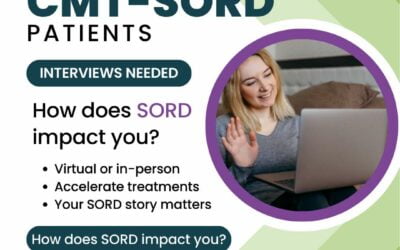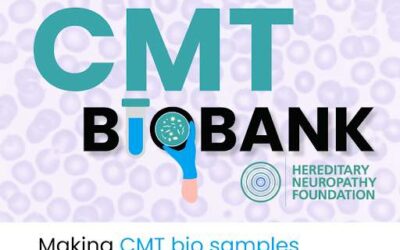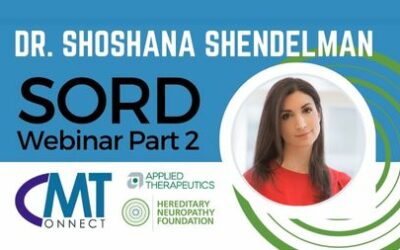Newly discovered gene affecting 1 in 100,000 individuals
SORD is a genetic metabolic disease resulting in CMT neuropathy. SORD Deficiency patients are missing a key enzyme needed to metabolize a sugar called sorbitol. It’s progressive and debilitating affecting the peripheral nerves and motor neurons resulting in loss of sensory and decreased mobility.
Research Opportunity: CMT-SORD
Research Opportunity: CMT-SORD
I am writing to you today because there is a research opportunity you may be eligible for. When you joined HNF’s Global Registry for Inherited Neuropathies (GRIN), you agreed to be contacted regarding these opportunities.
Since 2001, the Hereditary Neuropathy Foundation has been committed to improving the lives of those living with CMT through research, awareness, and advocacy. GRIN is the ONLY comprehensive patient registry collecting patient-reported information about living with CMT in combination with genetic reports, clinical assessments, electronic health records and other critical data for research. GRIN is critical for characterizing and understanding how the different types of CMT, for which there are currently no treatments or cures, affect patients. Not only is GRIN expected to provide valuable information for families and health care providers to make the best care decisions possible, it can also help researchers decide which are the most critical challenges to address. Furthermore, GRIN can help investigators to find patients who might be a good match for their studies. Another important aspect of GRIN is to provide data to the FDA, EMA and other regulatory agencies when applicable; and industry to help design clinical trials and facilitate patient recruitment.
CMT-SORD: WHAT IS YOUR STORY?
For many with CMT, the journey through diagnosis, acceptance, and living with this progressive disease can be isolating. Most research is conducted through a clinical lens that aims to improve symptoms. However, CMT does not affect only the body. It affects a human being who has remarkable lived experiences to share.
This study aims to diversify the conversation around CMT. Medicines treat symptoms to improve one’s quality of life. However, without sharing people’s stories and learning about their lived experiences, the clinical field might miss opportunities to render more effective healthcare. Having these conversations is especially important for CMT.
WHAT IS THIS CMT RESEARCH OPPORTUNITY?
This CMT research opportunity is our chance to understand how CMT-SORD impacts the person. Through ethnographic data collection, this study will record the stories of how CMT-SORD has impacted the everyday lives of those living with this unique type of CMT.
Ethnographic data collection is a research method involving talking with people to understand their daily lives and how things, such as living with a progressive disease, impact them. The goal is to create a comprehensive account of daily life from the participants’ perspective.
WHERE IS THIS CMT RESEARCH TAKING PLACE?
This CMT research takes place right in the comfort of your own home. Participants will participate in at least 3 online or in-person interviews. These interviews may last from one hour to several hours (depending on your preference). Participation is voluntary and interviews can be stopped at any time. You should have access to a private space or one you feel comfortable in to freely speak about your experiences. Some of the topics discussed in these interviews may bring about uncomfortable emotions depending on your life experiences. For example, “What was it like to go through the diagnosis process? How did you feel?”
Clarissa Lesky is leading this study. She is a CMT-SORD community member and researcher at UCLA in Los Angeles, California, and will conduct the interviews. A few participants may be selected to have the interviews conducted in person. In-person interviews are voluntary, and your decision will not influence your participation eligibility.
WHO IS ELIGIBLE TO PARTICIPATE IN THIS CMT RESEARCH?
Anybody with a confirmed genetic diagnosis (genetic confirmation) of CMT-SORD, who is at least 18 years old, and who lives within the continental United States is invited to participate. Since phone/video interviews are the main components of this study, participants must be fluent in English.
HOW DO I PARTICIPATE IN THIS CMT RESEARCH OPPORTUNITY?
If you or someone you know might be eligible to participate in this research, please contact the principal investigator (PI), Clarissa, at [email protected]. In the email subject line, please mention “SORD Study”, “SORD Interview”. Be sure to include that you are in GRIN. Your de-identified data can then be shared with the researcher for a more robust patient profile.
WHAT DOES THIS CMT RESEARCH OPPORTUNITY MEAN FOR ME?
This CMT research opportunity is your chance not only to help increase the understanding of CMT but also to help accelerate advancements towards treatments and, ultimately, a cure for this disease.
The main goal of this CMT research project is to understand better how CMT-SORD affects the person in their daily life, to gain insights that will guide future treatment research needs, and to improve how providers deliver healthcare to the community.
Update your GRIN profile today!.
HNF Research Initiatives
FDA Repurpose Drugs
In September 2021, HNF partnered with Rarebase, a public benefit company that leverages cutting-edge technology (Function, a tech-enabled drug discovery platform) and biology using FDA-approved drugs to deliver accelerated, off-label treatments for CMT1A. HNF has completed Phase I of the project.
Novel Disease Modifying Drugs
Applied Therapeutics (AT)
A clinical-stage biopharmaceutical company partnered with HNF in 2020 to support the development of AT-007. AT is conducting the INSPIRE international phase III randomized interventional trial for SORD deficiency. This trial is designed to investigate the ability of AT-007 versus placebo to reduce toxic sorbitol levels and to evaluate the effect of AT-007 on improving disease symptoms over a longer period. HNF has been instrumental in helping to facilitate and accelerate the approval of their clinical lead product AT-007, an Aldose Reductase Inhibitor (ARI) currently in clinical trials.
University of Miami
To support the development of therapies for SORD deficiency, HNF developed and owns a SORD deficiency rat model in collaboration with Stephen Züchner, MD, Phd at University of Miami.
Natural History Studies
The Global Registry for Inherited Neuropathies (GRIN)
Developed in 2013 to stratify large groups of patients for all types of CMT to gain a deeper understanding of CMT. This important data also allows HNF to better identify the burden, diagnostic journey, and prevalence of CMT that will aid TRIAD research partners. Patient data = Improved Research & Clinical Trial Design.
CMT&Me App
A smartphone digital study sponsored by Pharnext Pharmaceuticals in collaboration with HNF, other CMT advocacy groups and experts in six countries to collect real-world anonymised data from adults (≥18 years) living with CMT. The aggregated data is available in close to real time, via dashboards and is analyzed based on pre-set criteria (ie. diseases stage, daily symptoms, age, demographics) to understand the real-world impact of CMT and the unmet needs of patients.
If you don’t know your CMT type, you can find out from the HNF through The CMT Genie Program.
www.cmtgenie.orgResearch Opportunity: CMT-SORD
Research Opportunity: CMT-SORD I am writing to you today because there is a research opportunity you may be eligible for. When you joined HNF’s Global Registry for Inherited Neuropathies (GRIN), you agreed to be contacted regarding these opportunities. Since 2001, the...
2025 CMT Roadshow Coming to a City Near You?
Do you want to make a difference in CMT research? HNF is looking for patients with a confirmed CMT diagnosis to participate in the CMT Biobank
Breaking News for SORD Deficiency Patients
The INSPIRE trial is a Phase 3 double-blind placebo-controlled registrational study evaluating the effect of once-daily (QD) oral govorestat (AT-007) in 56 patients aged 16-55 with SORD Deficiency in the US and Europe.
Great News From HNF TRIAD Industry Partner — Applied Therapeutics
Applied Therapeutics, Inc. has announced that their drug candidate, AT-007 (Govorestat), has received orphan medicinal product designation
SORD Webinar – Part 2 – Clinical Trial Update
Clinical Trial Update for SORD Deficiency – Applied Therapeutics – Dr. Shoshana Shendelman
SORD INSPIRE Phase III Clinical Trial
HNF Partner Applied Therapeutics is Currently Enrolling SORD Deficiency Patients for the INSPIRE Phase III Clinical Trial
SORD: A Lesson in Repurposing Drugs to Treat Hereditary Neuropathy
Research from a mutation on the SORD gene
Free CMT Genetic Testing for a Common Axonal type of CMT to Prepare for Clinical Trial
A new type of Charcot-Marie-Tooth (CMT) has recently been identified caused by mutations in the SORD gene.
Novel findings of a new common type of CMT2 that might be the 1st step to a treatment: SORD gene deficiency, the most common autosomal-recessive type of CMT
a mutation in the SORD gene that may may affect 60,000 patients worldwide








